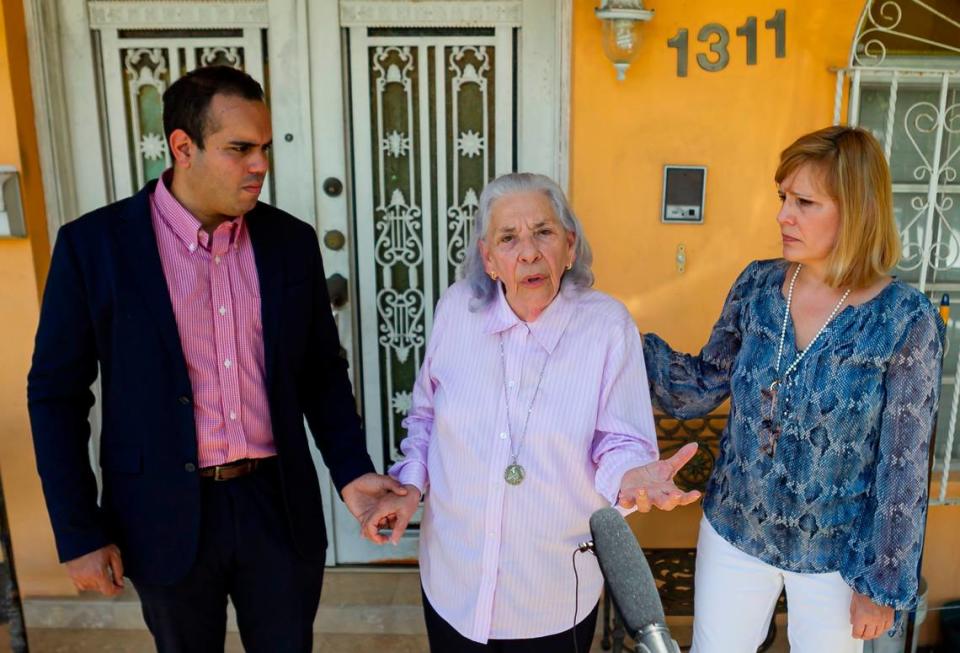Former Cuban political prisoner ordered to pay $100,000 bond to avoid eviction
A judge has ordered Ana Lazara Rodriguez, the former Cuban political prisoner at risk of being evicted from her home in Miami, to post $100,000 in bond money in order to delay her eviction so she can present evidence of bank fraud upon the court.
Judge Peter R. Lopez ruled in Miami-Dade Circuit Court on May 5 that Rodriguez, 82, must post the bond in order to halt the Writ of Possession — the final document that allows Miami-Dade Police to physically carry out the eviction — that was issued in the case on Feb. 16, 2021.
The bond money would be used to pay mortgage carrying costs, taxes, attorney’s fees and other damages incurred during the extra wait time by the current owner of the house, California-resident Vanessa Veytia, who bought the home for $414,000 in August 2020.
Although Judge Lopez gave Rodriguez a 4 p.m. Thursday deadline to post the bond, attorney Bruce Jacobs, who is representing Rodriguez pro bono, is going to ask the judge to reconsider that deadline in a future hearing. No date has been set yet for that session.

“We are making a clarion call to anyone who is willing to help,” Jacobs said. “We told the judge we would raise whatever money he required from the community and will ask him to accept our best efforts. We expect to be able to ensure that any possible damages Ms. Veytia might incur by a brief delay will be covered.”
Attorneys for Veytia did not respond to a request for comment.
At a press conference held Thursday afternoon at Rodriguez’s home, Laura Wagner, executive director for the advocacy group Floridians for Honest Lending, said she hoped this case would remind people that the repercussions of the fraudulent lending practices prevalent leading up to the 2008 recession are still being felt.
“Ana’s story is one of tens of thousands all over the state,” Wagner said. “Ana is facing eviction and we hope the community can come together to save her home. The judge imposed a $100,000 bond in 24 hours time. That’s a hurdle most people can never overcome.”
Wagner said donations made to a Fundly page for Rodriguez will go toward the bond she needs to pay.
Attorney Jacobs is arguing that Rodriguez’s eviction and the foreclosure, which was brought by Bank of New York Mellon, are both illegal and fraudulent because they used robo-signed mortgage assignments and forged rubber-stamped endorsements to prove their right to foreclosure. Forgery is a felony in Florida.
“It would be an abuse of discretion to allow this eviction by a fraudulent foreclosure during a pandemic,” Jacobs wrote in an emergency motion to stop the writ of possession from moving forward. “The court is charged with protecting the constitutional rights of litigants that come before it. Certainly, Ms. Rodriguez deserves to be heard before being forced from her home.”
On Friday and Monday, Jacobs will go before two different judges to present evidence of forgery and perjury in two similar foreclosure cases.

Rodriguez, who shares the home with a fellow former Cuban political prisoner suffering from Alzheimer’s, has not paid rent or mortgage on the home since it went into foreclosure in 2009.
“The most important thing about all of this is I can be a voice for people who don’t have a voice,” Rodriguez said during Thursday’s press conference. “I can be the one to denounce this fraud, which is enormous, and affects an incalculable number of people. I think it’s time for the banks to account for everything they have done.”
On February 25, spurred by Rodriguez’s case, the Miami City Commission unanimously passed a resolution urging Miami-Dade Mayor Danielle Levine Cava not to enforce evictions until the subjects at risk had exhausted all their legal options.
“What’s happening in Ms. Rodriguez’s case is very troubling,” Levine Cava wrote to the Herald in an email on Feb. 25. “Her case is in process in the courts and no action will be taken by the county until she has had due process. In the meantime my administration is taking all possible steps to connect her with resources and support her at this extremely difficult time.”

